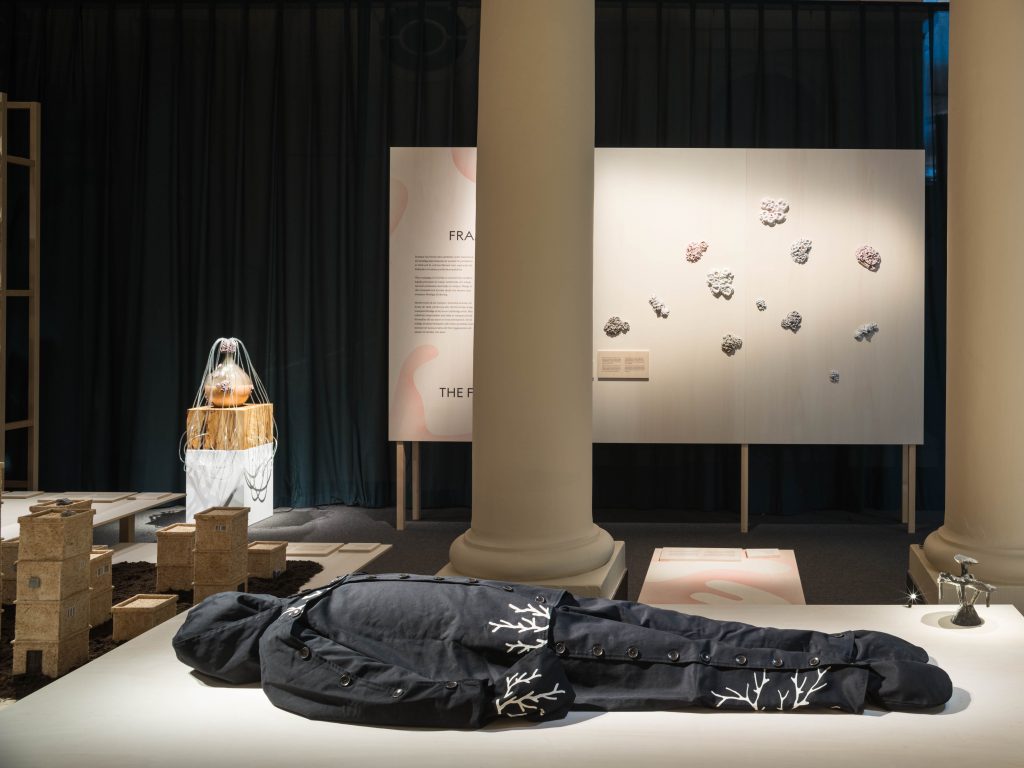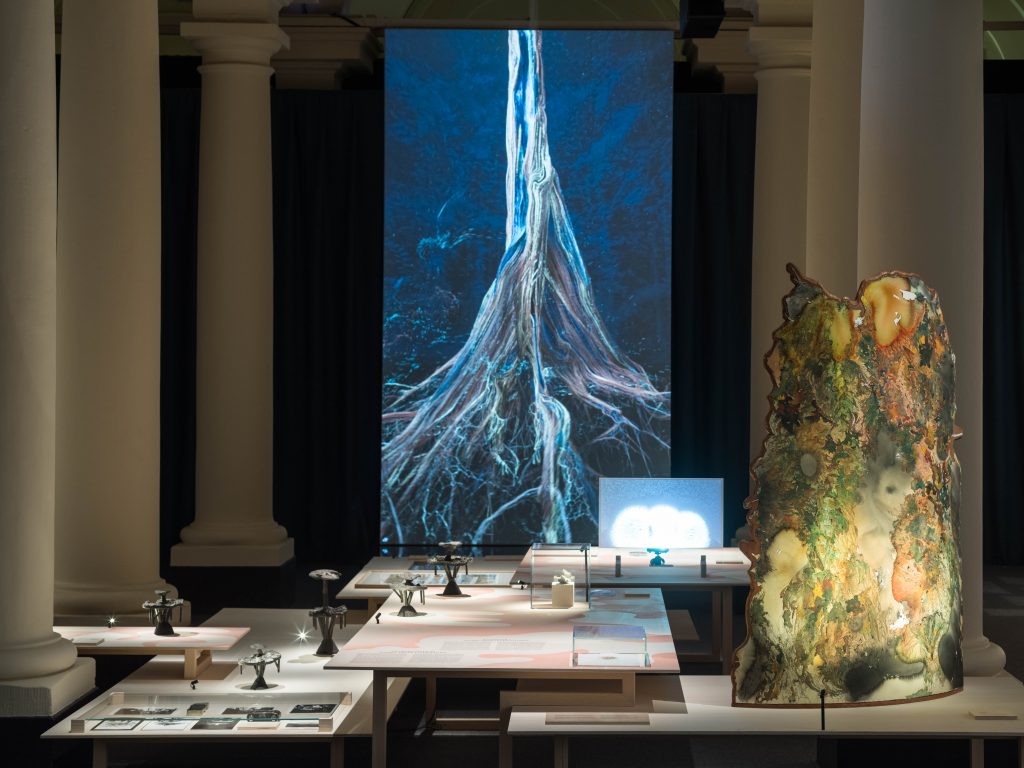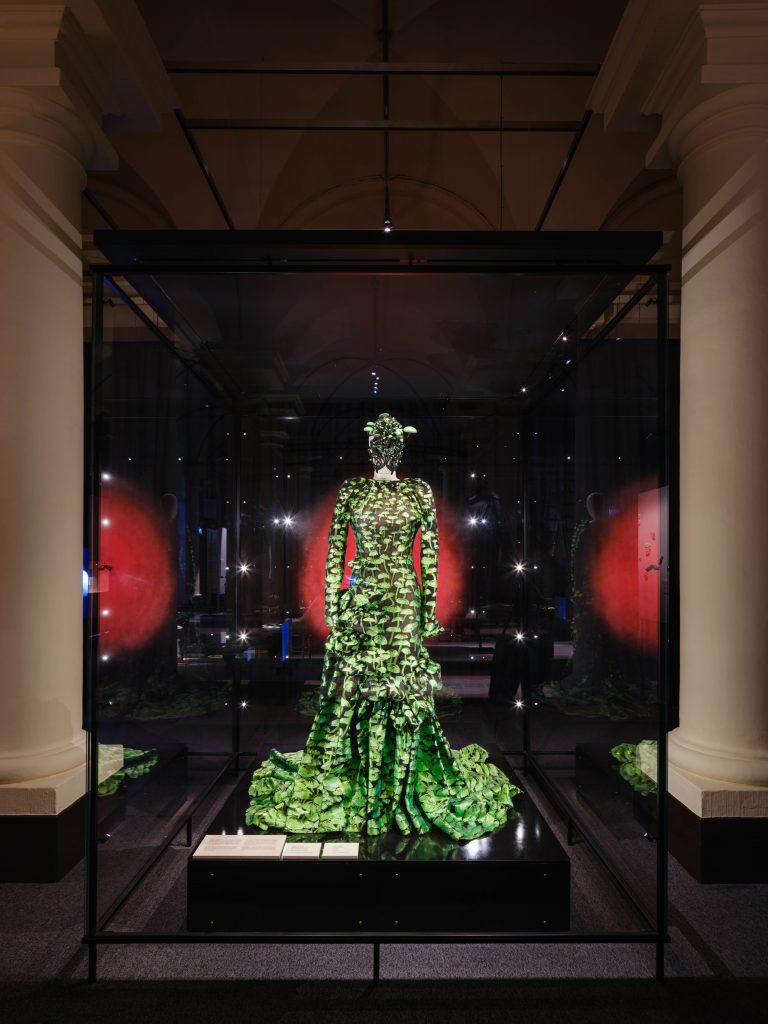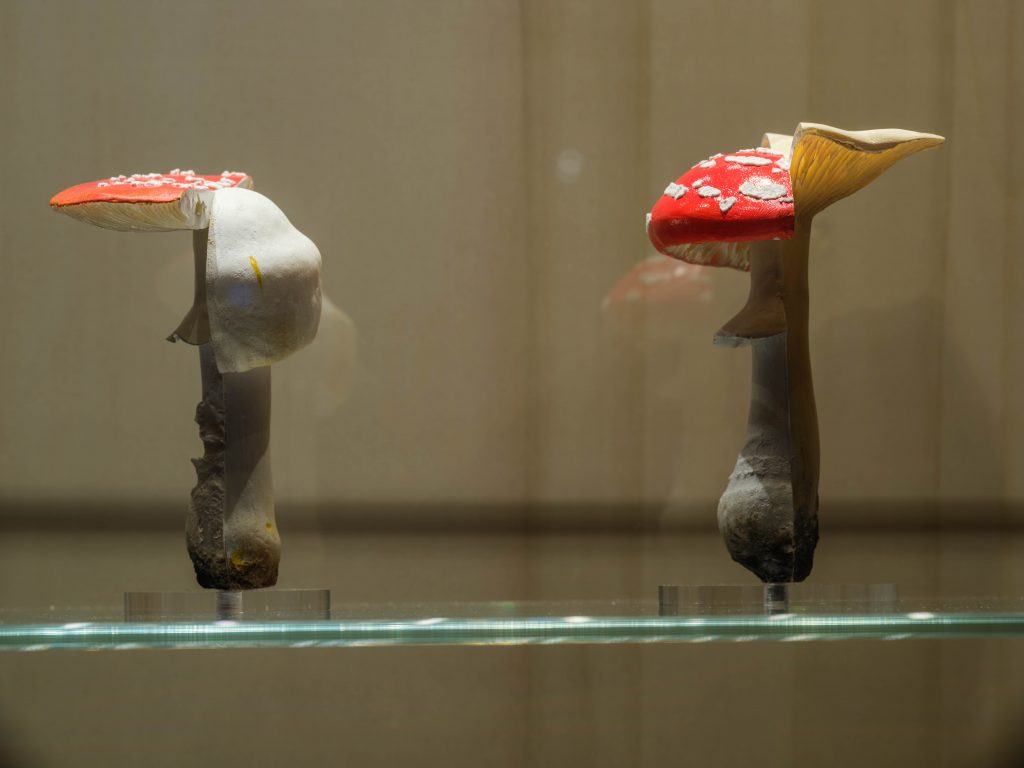“There is a great deal of contemporary interest in fungi,” says Erika Lanner, Director of the Nobel Prize Museum. “By creating a thought-provoking encounter between art and science, we are continuing to work with an approach that also provided the basis for our acclaimed Life Eternal exhibition at Liljevalchs art gallery in Stockholm last autumn.”
Carsten Höller’s sculptures of fly agarics are be placed next to Anna Dumitriu & Alex May’s artistic manipulations of yeast. Visitors can experience the monumental video installation Sanctuary of the Unseen Forest by Marshmallow Laser Feast next to illustrator Joanna Hellgren’s newly created comics. And Daniel Del Core’s mushroom-themed dress, created for Icelandic musical artist Björk, occupies its own display case.
In recent decades, research has provided us with new knowledge about fungi and the role of these organisms in nature – but also about potential ways of using their characteristics in everything from the development of new pharmaceuticals to building materials or clothing.
“During our work, it has become clear how new insights have also created new questions – the world of fungi is still full of mysteries that remain for science to solve,” says Karl-Johan Cottman, curator of the exhibition.
Visitors can also enter Nobel Prize laureate Olga Tokarczuk’s literary world, which is teeming with mushrooms. In her book House of Day, House of Night, she states: “If I wasn’t a human being, I would like to be a mushroom.” They can gain new insights into medicine laureate Alexander Fleming’s working methods. During the 1920s, he discovered that some bacteria stopped growing when they came into contact with a particular mould (a form of fungus). This discovery later led to the development of penicillin.
The exhibition Fungi – In Art and Science will be on display from 30 September 2023 to 7 January 2024.
Exhibition curators: Karl-Johan Cottman and Magnus af Petersens
Exhibition design: Birger Lipinski
Graphic design: Ateljé Grotesk
Artists participating in the exhibition: Balenciaga, Daniel Del Core, Anna Dumitriu & Alex May, Seana Gavin, Joanna Hellgren, Carsten Höller, Mae-ling Lokko, Marshmallow Laser Feast, Maurizio Montalti, Iwo Myrin, Olle Norås, Jae Rhim Lee, Phil Ross & Vera Meyer, Amanda Selinder, Lisa Schönberg & Allie ES Wist and Wim van Egmond.
Researchers featured in videos that are part of the exhibition include: Anders Dahlberg, mycology (Swedish University of Agricultural Sciences), Henrik Drake, environmental science (Linnaeus University), Hanna Johannesson, mycology (Stockholm University/Swedish Royal Academy of Sciences), Johan Lundberg, psychiatry (Karolinska Institutet), Anna Rosling, mycology (Uppsala University) and Sven Olov Wallenstein, philosophy (Södertörn University).
Press images: https://nobelprize.org/press-images-fungi
-

Illustration view. Foto: Jean-Baptiste Béranger
-

Installation view. Photo: Jean-Baptiste Béranger
-

Photo: Jean-Baptiste Béranger
-

Photo: Jean-Baptiste Béranger
-
Illustration view. Foto: Jean-Baptiste Béranger
-
Installation view. Photo: Jean-Baptiste Béranger
-
Photo: Jean-Baptiste Béranger
-
Photo: Jean-Baptiste Béranger
More about the works, artists and researchers
Three works by Olle Norås are on display in the exhibition.
“Much of my painting is based on my having a fantasy that I am a dead log in the forest that is beginning to decompose and be filled with other life − fungi, lichens and plants. That’s why I think the theme of the exhibition is absolutely brilliant for me,” says Olle Norås.
Joanna Hellgren has drawn seven comic stories for the exhibition. Some of them are horror comics about things like cellar fungus and the parasitic fungus called fly mould, while others are factual comics about ancient giant fungi and the role of fungi in the origin of life on land. The artist collaborated with researchers, who fact-checked her manuscripts.
“I became more curious the more I learned during this work, but I realise that I am a beginner. The comics have slightly different approaches. Sometimes the mushrooms do the talking, and sometimes they are more factual,” says Joanna Hellgren.
Henrik Drake, associate professor of environmental science at Linnaeus University, is one of the researchers participating in the exhibition. He appears in a video together with five other researchers.
“I tell about my job investigating the deep biosphere, what is under our feet, several kilometres down. I have found fossil traces of fungi in environments where life was not believed to be possible. This may tell us something about how life on Earth arose or in what environments in space there is potential for life,” says Henrik Drake.
At the launch of Icelandic musical artist Björk’s album Fossora, she wore a mushroom-themes dress designed by Daniel Del Core. The dress is one of several fashion items featured in the exhibition on fungi in art and science. The mask that comes with the dress was made by the Swedish artist David Åberg.
“I am fascinated by evolution and adaptability: survival strategies that lead to constant reinvention, both in the human and the natural realms. Fungi are a perfect example, glowing mushrooms in particular. This dress, a full mantle of jacquard fungi, swarms in flaps moving on and around the body like they were fungi growing on wet soil. I worked with a pale green glow that emanates directly from the body and the lurex threads do retain a luminous tingle. It’s an homage to growth and change, as the natural and the artificial collide in a celebrating of beauty in its complexities,” says Daniel Del Core, Creative Director of Del Core.
David Åberg tells about his collaboration with Daniel Del Core: “Daniel wanted to create a mask and sent me a bunch of inspirational pictures. Usually you start somewhere and then the project takes its own journey. It’s very exciting and you never know where you’ll end up. So was a very organic process where we went back and forth, I sculpted and he drew on top and directed.”
Another work on display in the exhibition is the Phil Ross & Vera Meyer biogenerator. Vera Meyer says:
”Fungi influence almost every aspect of our daily life. Their metabolic power is unmatched in nature, they are biological dynamos and fungal biotechnology is the foundation upon which many other industries are based, including pharma, food, textile, and biofuel industries. Fundamental to fungal biotechnology are bioreactors in which fungi sustainably transform renewable feedstocks into goods for our everyday life. Our SciArt contribution tries to appreciate the beauty and diversity of microscopically small fungal cell factories and their infinitely large contribution to our life through bioreactor technology.”
For further information, please contact
Rebecka Oxelström, Head of Press, rebecka.oxelstrom@nobelprize.org
+46 8 122 084 45
Nobel Prize Museum
The Nobel Prize shows that ideas can change the world. The courage, creativity and perseverance of the Nobel Prize laureates inspire us and give us hope for the future. Films, in-depth tours, and artefacts tell the stories of the laureates and their contributions ‘for the greatest benefit to humankind’. Based on the Nobel Prize’s unique combination of fields – natural sciences, literature and peace – we examine the greatest challenges of our time and show how we can respond to them through science, humanism and collaboration. With our exhibitions, school programmes, lectures and conversations, we at the Nobel Prize Museum strive to engage the public in making a better world. Today we are located at Stortorget in Gamla Stan, Stockholm’s Old Town district. We are planning to create a new home for our Nobel Prize public outreach activities at Slussen in central Stockholm.
Disclaimer: The Nobel Prize Museum is not directly or indirectly involved in the process of nominating or selecting Nobel Prize laureates. These procedures are strictly confidential and regulated by the Nobel Prize awarding institutions.
© Nobel Prize Museum 2023. Nobelpriset®, Nobel Prize® and the Nobel Prize medal are registered trademarks of the Nobel Foundation.